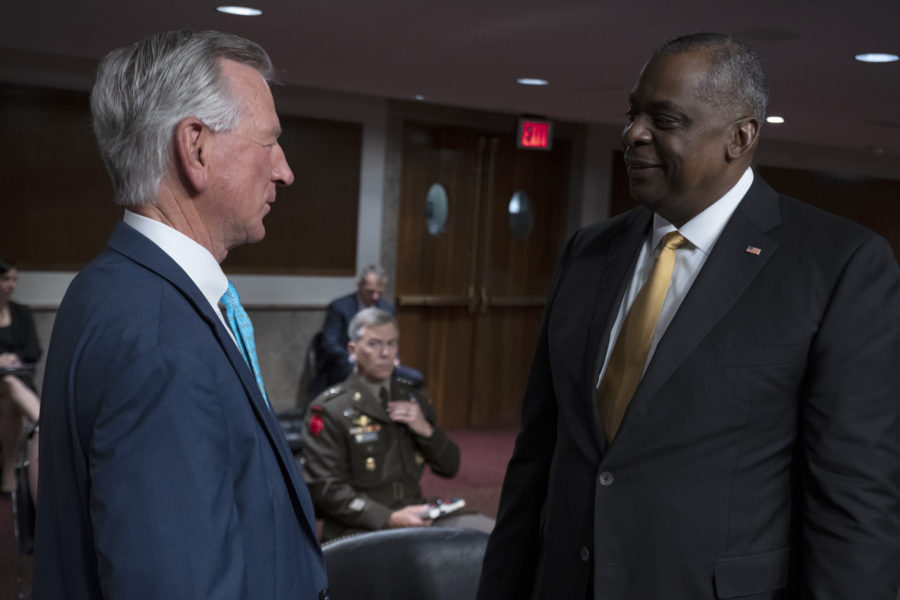Secretary of Defense Lloyd J. Austin III issued a lengthy warning over the ongoing hold on senior military promotions led by a Republican senator, warning that the effort is “unprecedented in its scale and scope” and poses a “clear risk” to the U.S. military’s ability to function properly.
“This indefinite hold harms America’s national security and hinders the Pentagon’s normal operations,” Austin wrote in a four-page letter dated May 5 in response to a request from Sen. Elizabeth Warren (D-Mass.), chair of the Senate Armed Services subcommittee on personnel. “The longer that this hold persists, the greater the risk the U.S. military runs in every theater, every domain, and every service.”
For months now, Sen. Tommy Tuberville (R-Ala.), has spearheaded an effort to block general and flag officer promotions to protest the Pentagon’s new reproductive health policies, which provide paid leave and travel expenses for service members who must travel to receive an abortion. There are currently 196 military nominations pending in the Senate, Democratic lawmakers said.
The hold has created a looming void at the top of U.S. uniformed leadership, and is already having negative effects across the DOD, Austin said. The Defense Secretary added the move could cause “acute, self-inflicted problems.”
According to Austin, Tuberville’s hold will affect 64 three- and four-star positions due to rotate in the next 120 days, including the top officers of the Army, Navy, and Marine Corps, as well as the heads of U.S. Northern Command and U.S. Cyber Command, the latter of whom also serves as the director of the National Security Agency.
“Without these leaders in place, the U.S. military will incur an unnecessary and unprecedented degree of risk at a moment when our adversaries may seek to test our resolve,” Austin wrote.
The Senate normally confirms thousands of military nominations a year, almost all through uncontroversial, unanimous consent. But Tuberville, who has garnered support for his effort from some other Republican lawmakers, wants the upper chamber to have to vote on military nominations one at a time. Senate floor time is scarce, meaning the Senate would be put off of other work to conduct the time-consuming votes. Tuberville claims the DOD’s new abortion leave policy violates the Hyde Amendment, which blocks federal funds from being used for most abortions. The Department of Justice has said the DOD’s new policies are lawful.
“This blockade is recklessly harming U.S. military readiness and derailing the apolitical, merit-based promotions of some of our nation’s best and brightest officers for purely partisan reasons,” Sen. Jack Reed (D-R.I.), chairman of the Senate Armed Services Committee, said in a statement.
Austin warned the list of affected officers will significantly swell in the next nine months, with 80 three- and four-star rotations projected across the DOD, including the Chairman of the Joint Chiefs of Staff and the Vice Chief of Staff of the Air Force.
News reports indicate President Joe Biden plans to select Air Force Chief of Staff Gen. Charles Q. Brown Jr. to replace Army Gen. Mark A. Milley as Chairman of the Joint Chiefs, a move subject to Senate confirmation. That would also create a vacancy for the Air Force’s top job.
Austin said the impact extends beyond the very top officers, with a cascading effect through the U.S. military.
“In total, between now and the end of the year, the Department projects that approximately 650 general and flag officers will require Senate confirmation,” Austin wrote. There are large number of one- and two-star promotions on hold for jobs that may not be high-profile but help ensure the military functions, he said.
“The department relies on these experienced leaders to execute tactical actions every day and extend our strategic advantages for the long term …. their importance cannot be overstated,” wrote Austin, who added that some leaders might have to take on the responsibilities of two positions at once because other leaders’ confirmations are stalled or have “less experienced decision-makers in charge.”
Austin, a retired Army general, also noted some officers’ personal and family lives are in limbo, a concern shared by Secretary of the Air Force Frank Kendall. Even if the promotions eventually go through, Kendall told lawmakers earlier this month, family members will have still faced costs.
“They have to plan to get their children into schools, where they’re going to be established, and in their new homes, so there’s a very personal toll this takes as well,” Kendall said. “One of the things that motivates our people in terms of retention or not, is how they feel that their families are being treated. …. We ask our military families to move multiple times during their career. It’s something that they accept, but when their planning for that is disrupted, it has a very negative impact and it definitely impacts on retention as well.”
Kendall, who also served in the military, argued that even if competent officers fill soon-to-be vacant positions in the interim, their ability to lead would be hampered.
“Generally people, if they’re going to retire, they’re still going to retire,” Kendall said. “So a junior person will step up and be acting for a period of time. Those people are limited in what they can do. They generally are not going to make any major initiatives or make any major changes because they know they’re not going to be there very long. They expect that they’ll be replaced very shortly. So they’ll keep the trains running, but they’re not going to move the organization forward as much as they might be otherwise.”
